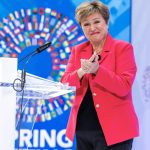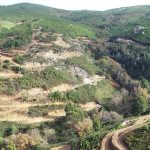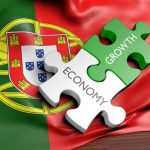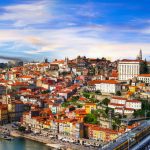Pedro Duarte, Minister of Parliamentary Affairs at the International Club of Portugal – Political challenges for 2025
Text: Chris Graeme; Image: Fernando Bento (ICPT)
Portugal’s Minister for Parliamentary Affairs warned that extremists are beginning to gain ground in the country’s political life on Tuesday.
Speaking at a lunch organised by the International Club of Portugal (ICPT) on Tuesday at a Lisbon hotel, Pedro Duarte said evidence of this could be seen from the fact that hours before the lunch, the far-right populist Chega had delivered a motion of no-confidence against the current centre-right coalition government Democratic Alliance (AD) led by PSD Prime Minister, Luís Montenegro over “serious suspicions of incompatibility” in exercising public duties.
No confidence motion “a joke”
Duarte said that Chega was doing this to deflect attention from a raft of internal problems and scandals within his own party by presenting a no-confidence motion that was a “joke”.
For example, it was discovered recently that a Chega MP – since removed – had been caught on camera pilfering passengers suitcases at Lisbon International Airport. Police later found items and stolen suitcases stored at Miguel Arruda’s home.
At the same time, Pedro Duarte also slammed the leader of the PS Socialist Party, Pedro Nuno Santos, despite Santos saying that he would support the government by throwing out the no-confidence motion.
Behind the motion is a scandal enveloping Portugal’s Prime Minister over a real estate company held in the name of Luís Montenegro’s wife and sons.
Chega’s André Ventura says that the company stood to cash in on the recently revised Land Law – a vote in parliament which has now been postponed because of the allegations – which allows properties to be developed on certain parcels of rustic land at the discretion of municipal councils -, because of the family’s link to a mayor and a powerful local real estate developer in Espinho near Porto in the North of Portugal.
Ventura is now calling the episode an example of “suspected absolute corruption” calling it a “conflict of interests” while demanding that the Prime Minister gives a full and satisfactory explanation to the country.
However, Portugal’s Prime Minister insists he is not now connected to the company after renouncing his partnership in the company in 2022 and therefore sees no conflict of interest.
Yet the Chega party leader continues that he is not happy with the explanations given by the Prime Minister.
Pedro Duarte said that a no-confidence motion presented on Tuesday by the populist far-right part was “a joke”. He also accused the opposition PS party, Pedro Nuno Santos of “leaning towards populism” with a discourse that was “not dissimilar to that of the Chega leader” André Ventura.
“When we dissect what the leader of the PS says, it is basically almost the same as what Chega says. There seems to be a kind of competition to have a populist tone that sounds angry and extreme”, he said.
A change in world order
On the international and geopolitical front, the Minister of Parliamentary Affairs said that the world was going through a period of “great uncertainties” and a time of “transition and change”.
“We should be under no illusions that we are faced with a new era globally with a change in the world order at an accelerated pace with many alterations towards multilateralism so that it seems like the end of history as some have been forecasting”, he said.
The old strategic alliances, he added, “no longer made sense”, and that new alliances were being created.
Protectionism was moving forward at a “galloping rate” on a global scale with consequences for inflation while countries like China were on the rise, and were looking for a new role within the global context.
“We know that Russia compared to three years ago has turned the post-Cold War situation upside down and is clearly very different today.”
And the US with the new Trump administration had a vision and world concept that was very distinct from the Biden administration, and today has strategic alliances based on different principles and values.
At the same time, climate change was gaining more relevance on a daily basis, but was having an impact on competitive advantages with an increasing attitude of “if others are not (taking climate change seriously) then why should we.”
At the same time technology was taking centre stage at an accelerated rate with consequences at all levels, from the most basic human relations to the concept of post liberal democracy and at degrees that were different from five to 10 years ago.
“We have a European Union which in many senses is rudderless, one where the former Berlin axis (and Germany) is in a particularly difficult phase with immense political, economic and social problems,” he noted.
Viewing global uncertainty as an opportunity
Portugal had two choices; either to join in with this less optimistic and auspicious trend, or look at it as an opportunity for the country.
“I think that the government has done everything to look at this as a good opportunity for the country.”
The government had chosen two policies: on the one hand stability for the country; and on the other to project its ambitions.
“Perhaps these might seem contradictory, but they aren’t. From the point of view of stability, Portugal is today a beacon both globally and in Europe”.
Just some examples were: On the Global Peace Index 2024 Portugal is in 7th place out of 163 countries.
From a social point of view, Portugal managed to make a social pact with all partners (unions and business associations) with the exception of the traditionally very left-wing CGPT union over salary agreements.
As for public administration employees – in a sector which had been in a turbulent phase some years ago – agreements had been made on career progression with teachers that had brought stability to schools after years of strikes and protests.
When it came to the security forces (the police) and after years of street demonstrations and protests in front of the Portuguese parliament, agreements on working hours, conditions and pay had been struck while nurses, prison guards, justice employees, and firemen had all seen some of their demands met with agreements brokered.
“From a social point of view we have a peace that is not that common in terms of other European countries”, he remarked.
Relative political and economic stability
In terms of politics and political stability too, and despite having a relatively fragmented parliament and a government that does not have an absolute majority, “the truth is that we’ve managed to achieve our goals, such s getting the State Budget, which was the cause of an existential crisis, eventually passed by parliament.
“We have such political stability that we won’t be facing political crises or elections any time soon,” assured the minister.
Finally, in economic and financial terms, “we are a predictable country” with the government very clear on its direction and what it wants to achieve in the near future.”
Public finances on a sounder footing
Public finances too reflected an exemplary situation in European terms whereas, ironically, the situation was the complete opposite 10-15 years ago.
“They pointed the finger at us and now we (Greece and Portugal) are exemplary from this point of view”, he said in a nod to the Troika years.
Pedro Duarte affirmed that in terms of public accounts, Portugal enjoyed the biggest decrease in public debt in the whole of the Euro Zone.
And from the economic growth point of view, while being far from where the country wanted to be in terms of GDP, when compared to others, “Portugal today is a benchmark reference” and in 4Q of 2024 was the country in Europe that enjoyed the greatest quarter-on-quarter growth” and in like-for-like terms enjoyed the third highest growth behind Spain and Lithuania.
Speaking to journalists immediately after the lunch, Pedro Duarte admitted that he was “really tempted” to put himself forward as a candidate in the Porto Council Elections for mayor but said he would put this on the back burner until the Spring when he would announce his decision.
Pedro Duarte has an illustrious track record. He headed Corporate, External and Legal Affairs and European Government Affairs at Microsoft. (2011-2025)
The minister was also a national defence auditor on Portugal’s cybersecurity programme and chairman of the Portuguese Software Association (ASOFT) and a board member of AmCham (American Chamber of Commerce in Portugal).
Between 2008-2024 was the president of the Strategic Council for the Digital Economy at CIP (Portuguese Industrial Confederation).
Pedro Duarte was an MP in the Portuguese Parliament representing Porto between 1998 and 2011, and was Secretary of State for Youth under the government of Pedro Santa Lopes (1999-2001), and directed the first presidential election campaign in 2016 for the current Portuguese President, Marcelo Rebelo de Sousa.










